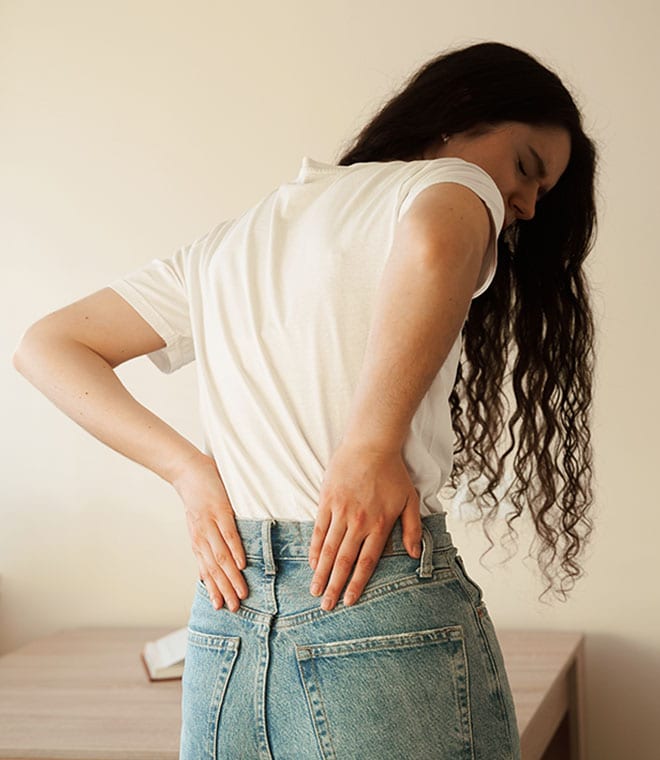Health
What causes constipation in pregnancy?
By Jenilee Matz, MPH May 21, 2025 • 4 min
About half of all pregnant women experience constipation at some point. If you have trouble passing stools or have fewer bowel movements than normal, you may be constipated. In general, constipation is defined as having fewer than three bowel movements per week.
Why does constipation happen during pregnancy?
Constipation can affect anyone, and it can happen for several reasons. It may be due to a low-fiber diet, not drinking enough water, a lack of physical activity, certain medications or a change in routine. Constipation is more common during pregnancy.
With pregnant women, hormonal changes are often responsible for causing constipation. Increased levels of progesterone can cause food and waste to move more slowly through the digestive tract so that more nutrients and water can be absorbed from the food you eat. In addition, the growing uterus and baby put pressure on the bowels. This can also contribute to constipation symptoms. Some women need iron supplements during pregnancy, and these supplements are also linked to constipation.
Is constipation a sign of pregnancy?
Although constipation during pregnancy can occur as early as the second or third month of the first trimester, it is not typically considered a first sign of pregnancy. Symptoms of pregnancy vary among women and among pregnancies. The first sign of pregnancy for many women tends to be a missed menstrual period. Swollen or tender breasts, fatigue, increased urination, nausea (with or without vomiting), bloating, and light spotting or cramping can be other early signs of pregnancy.
How can I manage constipation during pregnancy?
Lifestyle changes can often prevent and help ease pregnancy-related constipation:
- Drink plenty of fluids: Consuming enough liquids can help move food through the digestive system. Note that fluid needs increase during pregnancy. Try to drink about 10 cups of water and other liquids every day, such as nutritious juices and smoothies.
- Take in enough fiber: Fiber adds bulk to stool, which may increase how often you have bowel movements. Aim for at least 25 grams of fiber each day. Foods that contain fiber include whole grains, beans, fruits and vegetables.
- Exercise regularly: Inactivity increases your chance of constipation. Exercising during pregnancy can help you avoid constipation and improve your overall health. Strive to be active for 30 minutes, five days per week. Check with your healthcare provider before you increase your activity level.
If you take iron supplements and have constipation, talk to your healthcare provider about the best way to manage your symptoms. They may recommend that you meet your iron needs through diet or take smaller doses of the supplement throughout the day. Getting enough iron is important, especially during pregnancy, so do not stop taking supplements without talking to your provider first.
What is safe to take for constipation during pregnancy?
If lifestyle changes don't bring you relief, talk to your healthcare provider. They may suggest using over-the-counter (OTC) stool softeners, such as Colace. Stool softeners, which are generally considered safe during pregnancy, add liquid content to the stool, making it easier to pass. Your provider may also recommend a fiber supplement like Metamucil to soften stool and ease constipation. Do not use any OTC product or medication during pregnancy without checking with your healthcare provider first.
While occasional constipation can cause abdominal pain, swelling and discomfort, this digestive problem isn't usually harmful to mom or baby. In rare cases, chronic constipation can be a sign of another health issue. Contact your healthcare provider if you have severe constipation with abdominal pain, constipation that alternates with diarrhea, or if you have mucus or blood in your stool.
Updated by Rebeca Thomas RN, BSN, May 2025.
Sources:
- https://americanpregnancy.org/healthy-pregnancy/pregnancy-health-wellness/constipation-during-pregnancy/#:~:text=Is%20constipation%20during%20pregnancy%20ever,rectal%20bleeding%2C%20call%20your%20doctor
- https://www.mayoclinic.org/healthy-lifestyle/pregnancy-week-by-week/expert-answers/pregnancy-constipation/faq-20058550
- https://my.clevelandclinic.org/health/diseases/21895-pregnancy-constipation
- https://www.acog.org/womens-health/faqs/problems-of-the-digestive-system
- https://www.mayoclinic.org/healthy-lifestyle/getting-pregnant/in-depth/symptoms-of-pregnancy/art-20043853
- https://americanpregnancy.org/pregnancy-symptoms/early-signs-of-pregnancy/
- https://www.uptodate.com/contents/maternal-adaptations-to-pregnancy-gastrointestinal-tract
- https://www.eatright.org/food/vitamins-and-supplements/nutrient-rich-foods/fiber
- https://www.cdc.gov/physical-activity-basics/guidelines/healthy-pregnant-or-postpartum-women.html
- https://www.mayoclinic.org/healthy-lifestyle/pregnancy-week-by-week/in-depth/pregnancy-nutrition/art-20045082#y.




